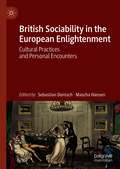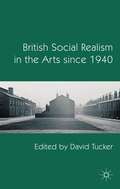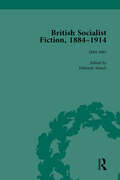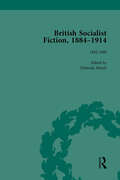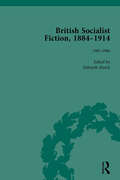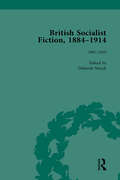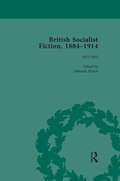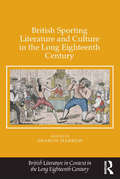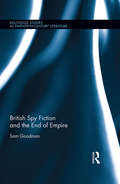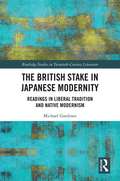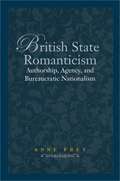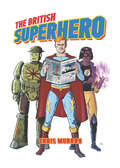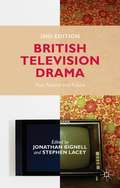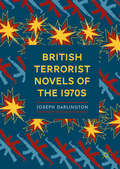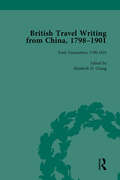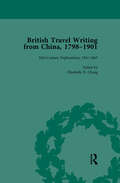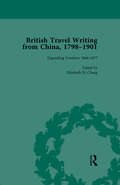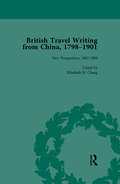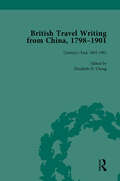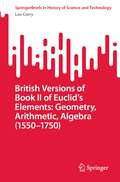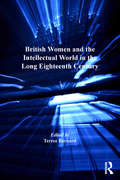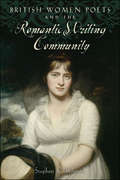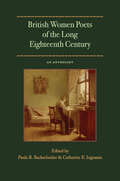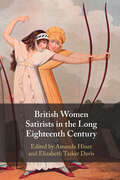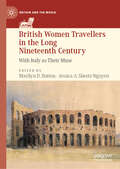- Table View
- List View
British Sociability in the European Enlightenment: Cultural Practices and Personal Encounters
by Sebastian Domsch Mascha HansenThis volume covers a broad range of everyday private and public, touristic, commercial and fictional encounters between Britons and continental Europeans, in a variety of situations and places: moments that led to a meaningful exchange of opinions, practices, or concepts such as friendship or politeness. It argues that, taken together, travel accounts, commercial advice, letters, novels and philosophical works of the long eighteenth century, reveal the growing impact of British sociability on the sociable practices on the continent, and correspondingly, the convivial turn of the Enlightenment. In particular, the essays collected here discuss the ways and means – in conversations, through travel guides or literary works – by which readers and writers grappled with their cultural differences in the field of sociability. The first part deals with travellers, the second section with the spreading of various cultural practices, and the third with fictional encounters in philosophical dialogues and novels.
British Social Realism in the Arts since 1940
by David TuckerThis is the first book of its kind to look across disciplines at this vital aspect of British art, literature and culture. It brings the various intertwined histories of social realism into historical perspective, and argues that this sometimes marginalized genre is still an important reference point for creativity in Britain.
British Socialist Fiction, 1884-1914, Volume 1
by Deborah MutchSocialism in late Victorian and Edwardian Britain was a highly literate movement. Every socialist group produced some form of written text through which their particular brand of politics could be promoted. This edition collects serialized fiction and short stories that have not been published since their original appearance.
British Socialist Fiction, 1884-1914, Volume 2
by Deborah MutchSocialism in late Victorian and Edwardian Britain was a highly literate movement. Every socialist group produced some form of written text through which their particular brand of politics could be promoted. This edition collects serialized fiction and short stories that have not been published since their original appearance.
British Socialist Fiction, 1884-1914, Volume 3
by Deborah MutchSocialism in late Victorian and Edwardian Britain was a highly literate movement. Every socialist group produced some form of written text through which their particular brand of politics could be promoted. This edition collects serialized fiction and short stories that have not been published since their original appearance.
British Socialist Fiction, 1884-1914, Volume 4
by Deborah MutchSocialism in late Victorian and Edwardian Britain was a highly literate movement. Every socialist group produced some form of written text through which their particular brand of politics could be promoted. This edition collects serialized fiction and short stories that have not been published since their original appearance.
British Socialist Fiction, 1884-1914, Volume 5
by Deborah MutchSocialism in late Victorian and Edwardian Britain was a highly literate movement. Every socialist group produced some form of written text through which their particular brand of politics could be promoted. This edition collects serialized fiction and short stories that have not been published since their original appearance.
British Sporting Literature and Culture in the Long Eighteenth Century (British Literature in Context in the Long Eighteenth Century)
by Sharon HarrowSport as it is largely understood today was invented during the long eighteenth century when the modern rules of sport were codified; sport emerged as a business, a spectacle, and a performance; and gaming organized itself around sporting culture. Examining the underexplored intersection of sport, literature, and culture, this collection situates sport within multiple contexts, including religion, labor, leisure time, politics, nationalism, gender, play, and science. A poetics, literature, and culture of sport swelled during the era, influencing artists such as John Collett and writers including Lord Byron, Jonathan Swift, and Henry Fielding. This volume brings together literary scholars and historians of sport to demonstrate the ubiquity of sport to eighteenth-century life, the variety of literary and cultural representations of sporting experiences, and the evolution of sport from rural pastimes to organized, regular events of national and international importance. Each essay offers in-depth readings of both material practices and representations of sport as they relate to, among other subjects, recreational sports, the Cotswold games, clothing, women archers, tennis, celebrity athletes, and the theatricality of boxing. Taken together, the essays in this collection offer valuable multiple perspectives on reading sport during the century when sport became modern.
British Spy Fiction and the End of Empire (Routledge Studies in Twentieth-Century Literature)
by Sam GoodmanThe position of spy fiction is largely synonymous in popular culture with ideas of patriotism and national security, with the spy himself indicative of the defence of British interests and the preservation of British power around the globe. This book reveals a more complicated side to these assumptions than typically perceived, arguing that the representation of space and power within spy fiction is more complex than commonly assumed. Instead of the British spy tirelessly maintaining the integrity of Empire, this volume illustrates how spy fiction contains disunities and disjunctions in its representation of space, and the relationship between the individual and the state in an era of declining British power. Focusing primarily on the work of Graham Greene, Ian Fleming, Len Deighton, and John le Carre, the volume brings a fresh methodological approach to the study of spy fiction and Cold War culture. It presents close textual analysis within a framework of spatial and sovereign theory as a means of examining the cultural impact of decolonization and the shifting geopolitics of the Cold War. Adopting a thematic approach to the analysis of space in spy fiction, the text explores the reciprocal process by which contextual history intersects with literature throughout the period in question, arguing that spy fiction is responsible for reflecting, strengthening and, in some cases, precipitating cultural anxieties over decolonization and the end of Empire. This study promises to be a welcome addition to the developing field of spy fiction criticism and popular culture studies. Both engaging and original in its approach, it will be important reading for students and academics engaged in the study of Cold War culture, popular literature, and the changing state of British identity over the course of the latter twentieth century.
The British Stake In Japanese Modernity: Readings in Liberal Tradition and Native Modernism (Routledge Studies in Twentieth-Century Literature)
by Michael GardinerThis book describes firstly a Japanese modernity which is readable not only as a modernising, but also as a Britishing, and secondly modernist attempts to overhaul this British universalism in some well-known and some less-known Japanese texts. From the mid-nineteenth century, and particularly as hastened by the spectre of China in the First Opium War, Japan’s modernity was bound up with a convergence with British Newtonian cosmology, something underscored by the British presence in Meiji Japan and the British education of key Meiji state-makers. Moreover the thinking behind Britain’s own unification in the long eighteenth century, particularly the Scottish Enlightenment, is echoed strikingly faithfully in the 1860s-70s work of Fukuzawa Yukichi, Nakamura Masanao, and other writers in the ‘Japanese Enlightenment’. However, from around the end of the Meiji era, we can see a concerted and pointed response to this British universalism, its historiography, its basis in the sovereign individual subject, and its spatial mapping of the world. Elements of this response can be read in texts including Natsume Sōseki’s Kokoro, Watsuji Tetsurō’s Fūdo (Climate and Culture), Tanizaki Jun’ichirō’s In’ei Raisan (In Praise of Shadows), Kawabata Yasunari’s Yukiguni (Snow Country), and various work of the mid-period Kyoto School. Rarely understood in terms of its British specificity, this response should have something to say to modernist studies more generally, since it aimed at a pluralism and de-universalisation that was difficult for mainstream British modernism itself. Indeed the strength of this de-universalisation may be precisely why these ‘native’ Japanese modernist tendencies have not much been accepted as modernism within the Anglophone academy, despite this field’s apparent widening of its ground in the twenty-first century.
British State Romanticism
by Anne FreyRomantic period authors are stereotyped as imaginative geniuses working in isolation from politics. In a rethinking of 19th century British Romantic fiction, Frey (English, Texas Christian U. ) argues that the writings of Samuel Taylor Coleridge, William Wordsworth, Walter Scott, Jane Austen, and Thomas De Quincey were not immune from being influenced by the increasing centralization of state power and bureaucratized cultural economy. Drawing on Foucault's model of the pastoral state, she contends that this "State Romanticism" movement offered an aesthetic model in which authors served as both creators and agents of this type of power structure. As in Austen's Persuasion, the state (via the navy in this case) is regarded as a means to shape individual and national character. Annotation ©2010 Book News, Inc. , Portland, OR (booknews. com)
The British Superhero
by Chris MurrayChris Murray reveals the largely unknown and rather surprising history of the British superhero. It is often thought that Britain did not have its own superheroes, yet Murray demonstrates that there were a great many in Britain and that they were often used as a way to comment on the relationship between Britain and America. Sometimes they emulated the style of American comics, but they also frequently became sites of resistance to perceived American political and cultural hegemony, drawing upon satire and parody as a means of critique. Murray illustrates that the superhero genre is a blend of several influences, and that in British comics these influences were quite different from those in America, resulting in some contrasting approaches to the figure of the superhero. He identifies the origins of the superhero and supervillain in nineteenth-century popular culture such as the penny dreadfuls and boys' weeklies and in science fiction writing of the 1920s and 1930s. He traces the emergence of British superheroes in the 1940s, the advent of "fake" American comics, and the reformatting of reprinted material. Murray then chronicles the British Invasion of the 1980s and the pivotal roles in American superhero comics and film production held by British artists today. This book will challenge views about British superheroes and the comics creators who fashioned them. Murray brings to light a gallery of such comics heroes as the Amazing Mr X, Powerman, Streamline, Captain Zenith, Electroman, Mr Apollo, Masterman, Captain Universe, Marvelman, Kelly's Eye, Steel Claw, the Purple Hood, Captain Britain, Supercats, Bananaman, Paradax, Jack Staff, and SuperBob. He reminds us of the significance of many such creators and artists as Len Fullerton, Jock McCail, Jack Glass, Denis Gifford, Bob Monkhouse, Dennis M. Reader, Mick Anglo, Brendan McCarthy, Alan Moore, Grant Morrison, Dave Gibbons, and Mark Millar.
British Television Drama: Past, Present And Future
by Jonathan Bignell Stephen LaceyFeaturing leading scholars of British television drama and noted writers and producers from the television industry, this new edition of British Television Drama evaluates past and present TV fiction since the 1960s, and considers its likely future.
British Terrorist Novels of the 1970s
by Joseph DarlingtonThis book discusses British novels published during the 1970s which feature terrorists either as main characters or a major plot points. The focus on terrorism’s literary depiction provides insight into the politics of the decade. The book analyses texts from Gerald Seymour, Anthony Burgess, V.S. Naipaul, Graham Greene, Doris Lessing, B.S. Johnson, Tom Sharpe, and Eric Ambler, among others, in order to engage with the IRA, the end of Empire, counterculture and environmentalism. The book provides a brief history of terrorism as a concept and tactic before discussing British literature’s relationship with terrorism. It presents a “standard terrorist morphology” by which to analyse terrorist narratives along with other insights into the British post-war imagination, writing and extremism.
British Travel Writing from China, 1798-1901, Volume 1
by Elizabeth H ChangIn 1793, Lord Macartney led the first British diplomatic mission to China in over one hundred years. This five-volume reset edition draws together British travel writings about China throughout the next century. The collection ends with the Boxer Uprising which marked the beginning of the end of informal British empire on the Chinese mainland.
British Travel Writing from China, 1798-1901, Volume 2
by Elizabeth H ChangIn 1793, Lord Macartney led the first British diplomatic mission to China in over one hundred years. This five-volume reset edition draws together British travel writings about China throughout the next century. The collection ends with the Boxer Uprising which marked the beginning of the end of informal British empire on the Chinese mainland.
British Travel Writing from China, 1798-1901, Volume 3
by Elizabeth H ChangIn 1793, Lord Macartney led the first British diplomatic mission to China in over one hundred years. This five-volume reset edition draws together British travel writings about China throughout the next century. The collection ends with the Boxer Uprising which marked the beginning of the end of informal British empire on the Chinese mainland.
British Travel Writing from China, 1798-1901, Volume 4
by Elizabeth H ChangIn 1793, Lord Macartney led the first British diplomatic mission to China in over one hundred years. This five-volume reset edition draws together British travel writings about China throughout the next century. The collection ends with the Boxer Uprising which marked the beginning of the end of informal British empire on the Chinese mainland.
British Travel Writing from China, 1798-1901, Volume 5
by Elizabeth H ChangIn 1793, Lord Macartney led the first British diplomatic mission to China in over one hundred years. This five-volume reset edition draws together British travel writings about China throughout the next century. The collection ends with the Boxer Uprising which marked the beginning of the end of informal British empire on the Chinese mainland.
British Versions of Book II of Euclid’s Elements: Geometry, Arithmetic, Algebra (SpringerBriefs in History of Science and Technology)
by Leo CorryThis book discusses the changing conceptions about the relationship between geometry and arithmetic within the Euclidean tradition that developed in the British context of the sixteenth and seventeenth century. Its focus is on Book II of the Elements and the ways in which algebraic symbolism and methods, especially as recently introduced by François Viète and his followers, took center stage as mediators between the two realms, and thus offered new avenues to work out that relationship in idiosyncratic ways not found in earlier editions of the Euclidean text. Texts examined include Robert Recorde's Pathway to Knowledge (1551), Henry Billingsley’s first English translation of the Elements (1570), Clavis Mathematicae by William Oughtred and Artis Analyticae Praxis by Thomas Harriot (both published in 1631), Isaac Barrow’s versions of the Elements (1660), and John Wallis Treatise of Algebra (1685), and the English translations of Claude Dechales’ French Euclidean Elements (1685). This book offers a completely new perspective of the topic and analyzes mostly unexplored material. It will be of interest to historians of mathematics, mathematicians with an interest in history and historians of renaissance science in general.
British Women and the Intellectual World in the Long Eighteenth Century (British Literature in Context in the Long Eighteenth Century)
by Teresa BarnardHighlighting the remarkable women who found ways around the constraints placed on their intellectual growth, this collection of essays shows how their persistence opened up attributes of potent female imagination, radical endeavour, literary vigour, and self-education that compares well with male intellectual achievement in the long eighteenth century. Disseminating their knowledge through literary and documentary prose with unapologetic self-confidence, women such as Anna Barbauld, Anna Seward, Elizabeth Inchbald and Joanna Baillie usurped subjects perceived as masculine to contribute to scientific, political, philosophical and theological debate and progress. This multifaceted exploration goes beyond traditional readings of women’s creativity to add fresh, at times controversial, insights into the female view of the intellectual world. Bringing together leading experts on British women’s lives, work and writings, the volume seeks to rediscover women’s appropriations of masculine disciplines and to examine their interventions into the intellectual world. Through their engagement with a unique perspective on women’s lives and achievements, the essays make important contributions to the existing body of knowledge in this important area that will inform future scholarship.
British Women Poets and the Romantic Writing Community
by Stephen C. BehrendtApproaching the work of Romantic-era British women poets through the lenses of public radicalism, war, and poetic form.This compelling study recovers the lost lives and poems of British women poets of the Romantic era. Stephen C. Behrendt reveals the range and diversity of their writings, offering new perspectives on the work of dozens of women whose poetry has long been ignored or marginalized in traditional literary history. British Romanticism was once thought of as a cultural movement defined by a small group of male poets. This book grants women poets their proper place in the literary tradition of the time. In an approach ripe for classroom teaching, Behrendt first reviews the subject thematically, exploring the ways in which the poems addressed both public concerns and private experiences. He next examines the use of particular genres, including the sonnet and various other long and short forms. In the concluding chapters, Behrendt explores the impact of national identity, providing the first extensive study of Romantic-era poetry by women from Scotland and Ireland. In recovering the lives and work of these women, Behrendt reveals their active participation within the rich cultural community of writers and readers throughout the British Isles. This study will be a key resource for scholars, teachers, and students in British literary studies, women’s studies, and cultural history.
British Women Poets of the Long Eighteenth Century: An Anthology
by Paula R. Backscheider and Catherine E. IngrassiaThis anthology gathers 368 poems by 80 British women poets of the long eighteenth century. Few of these poems have been reprinted since originally published, and all are crucial to understanding fully the literary history of women writers. Paula R. Backscheider and Catherine E. Ingrassia demonstrate the enormous diversity of poetry produced during this time by organizing the poems in three broad and deliberately overlapping categories: by genre, establishing that women wrote in all of the forms that men did with equal mastery and creativity; by theme, offering a revisionary look at the range of topics these writers addressed, including war, ecology, friendship, religion, and the stages of life; and by the poems’ more specific focus on the women’s experiences as writers.Backscheider and Ingrassia have selected poems that represent the best work of skilled poets, creating a wonderful mix of canonical and little-known pieces. They include the complete texts of longer poems that are abridged or omitted in other collections. Their substantial part introductions, textual notes, bibliographical information, and biographical sketches situate the poets and their writings within the cultural and political milieu in which they appeared. To generate further scholarship on this subject, this essential anthology puts primary texts in front of students, scholars, and general readers. It fills the persistent need to document women’s poetic expression during the long eighteenth century and to rewrite the literary history of the period, a history from which women have largely been excluded.
British Women Satirists in the Long Eighteenth Century
by Amanda Hiner Elizabeth Tasker DavisThis collection of innovative essays by leading scholars on eighteenth-century British women satirists showcases women's contributions to the satiric tradition and challenges the assumption that women were largely targets, rather than practitioners, of satire during the long eighteenth century. The essays examine women's satires across diverse genres, from the fable to the periodical, and attend to women writers' appropriation of a literary style and form often viewed as exclusively masculine. The introduction features a new theory of women's satire and proposes a framework for analyzing satiric techniques employed by women writers. Organized chronologically, the contributors' essays address a wide range of authors and explore the ways in which satiric writings by women engaged in contemporary cultural conversations, influencing assumptions about gender, sociability, politics, and literary practices. This inclusive yet tightly-focused collection formulates an innovative and provocative new feminist theory of satire.
British Women Travellers in the Long Nineteenth Century: With Italy as Their Muse (Britain and the World)
by Marilyn D. Button Jessica A. Sheetz-NguyenDuring the long nineteenth century, British women reframed the masculine paradigm of the Grand Tour. They created a feminist travel gaze, intentionally or unintentionally, that differed from that of male peers. Unlike their brothers, who went for personal edification, women with means left their English homes for the great Italian cities of Florence, Naples, and Rome to escape personal disappointments and the social limitations imposed by parents, spouses, and society. The anonymity of travel to a distant land and new freedoms fostered political and creative achievements, including entrepreneurial journalism, literary masterpieces, and social advocacy for their gender, which redefined the contours of the Anglo-Italian cultural landscape. The historical evidence presented here testifies to the life-changing capacity of travel and firmly demonstrates how British women’s history and literature enriches and broadens narratives about Britain and the World.
